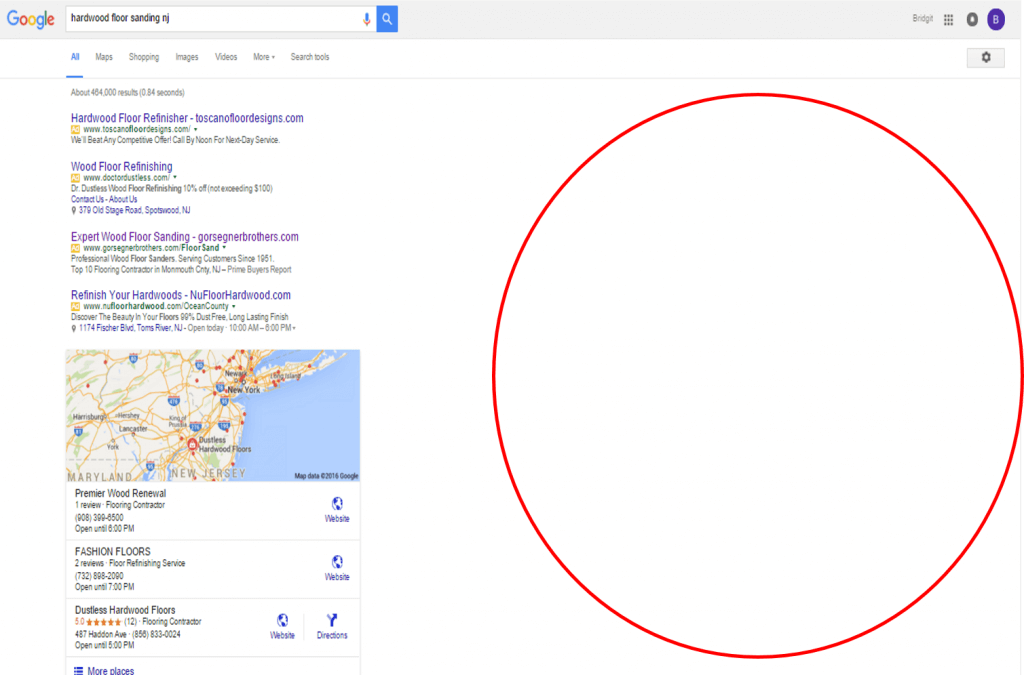Google Eliminates Right Nav PPC Ads
Have you noticed the giant empty space on the right side of your screen when you Google something? It’s new. That blank spot used to be filled with paid ads, targeted to whatever keyword you were searching for on Google. Over the weekend, Google announced that they will no longer be running ads on the right hand side. Instead, effective on February 22nd, the only ads will run in the center column, above the organic listings. This limits the number of ads served to 3 or 4, making the competition for key terms significantly more competitive – and expensive.
This empty space will be reserved for Product Listing Ads and Knowledge Graphs when applicable.
Impacts of Google’s Elimination of Right Hand Side Ads
1. Competitive key terms just got more competitive
With only four ad positions – down from ten – available on the first page of Google, bidding will intensify. Google has spent years analyzing which positions earn the highest click-thru-rate, and the center positions are overwhelmingly more effective, while the right hand side ads suffer from poor CTR, lower CPC, and ultimately, less revenue for Google.
By shrinking the available ad inventory, the first-page bids will necessarily sky rocket. Advertisers will find it harder to get their ad placed in positions 1-4. Ads with the highest CTRs will see the least amount of cost increase, but advertisers with low Quality Scores will end up throwing significantly more money at their campaigns in order to have a chance of being seen.
Thus focusing on raising your quality score (keyword targeting, ad copy, and landing page relevance) will become the only way for advertisers to afford many of their most productive keywords.
2. Ranking high organically became even more critical
For highly competitive terms, a fourth ad placement will be included at the top of the SERP. With more emphasis placed on these paid ads, organic listings are pushed further and further down the page. Historically, the first three organic listings receive up to 60% of all clicks, with only 4% of clicks on listings on page 2 and beyond. By pushing the organic listings further down the page, earning clicks will become even harder for pages not ranking in the top three. We can only wait and see how this change will affect that percentage.
SEO has always been a critical part of every website’s marketing efforts, but these new changes only underline how important ranking highly is for brands hoping to make an impact and gain traffic. Brands that had been forgoing SEO for PPC advertising will suddenly see their visibility severely limited.
3. Vigilant optimization and bidding is essential to success
Brands that manage their campaigns internally, or who adopt the ‘set it and forget it’ mentality to their PPC campaigns will start to fall off the 1st page. As average the CPC for keywords continues to rise, advertisers will need to ensure that their bids are competitive. Unfortunately, this is an ongoing process that involves continual monitoring. Using automated bidding strategies may be a backup option for some, but relying on this has many risks and could quickly go very wrong. There is little customization ability in automated billing, so focusing on the terms that really matter and not on others can prove challenging. If the PPC manager is not knowledgeable, automated bidding can quickly eat up your budget, without delivering the results you are hoping to see.
in order to be successful with limited ad positions, brands will need to carefully select the most important keyphrases and update their bidding manually – and frequently.
4. The importance of fully utilizing ad extensions can’t be overemphasized
With a limited number of ads, making yours stand out is imperative. Taking advantage of all of the different ad extensions can make your ad get noticed and perform better. Ads that use callouts, sitelinks, location, reviews, and/or structured snippets extensions not only generate more engagement, but tend to receive higher Quality Scores from Google. Higher Quality Scores benefit from discounted cost-per-clicks and higher placements. In the land of ever-increasing CPC’s, improving your quality score may be the only way for some advertisers to afford ad placements in the top three positions.
5. Small businesses and small budgets may be priced out of Google advertising
Small businesses looking to compete on a national scale may need to rethink their strategies. Focusing on hyper local terms or long-tail, more specific keywords may be the only options available in order to keep ROI and cost per acquisition within acceptable levels.
Taking a step back and analyzing whether continuing with a PPC campaign on Google still makes sense will be an important step for smaller businesses. Changing up the marketing mix to include more Facebook or other advertising strategies may end up being the only options available for limited budgets.
What to Do Next?
As the effects from this change continue to ripple out, your advertising strategy and budget will likely need to adjust. Talk to your marketing professional to discuss your plan of attack. If you are handling your PPC campaign in-house, this may be the time to consult with a specialized agency to ensure that your budget is being spent wisely and efficiently.
Talk to the PPC strategists at CMDS for an evaluation of your PPC campaigns and to ensure that you are maximizing your ROI. Email info@cmdsonline.com or call 732-706-5555 to get started.
